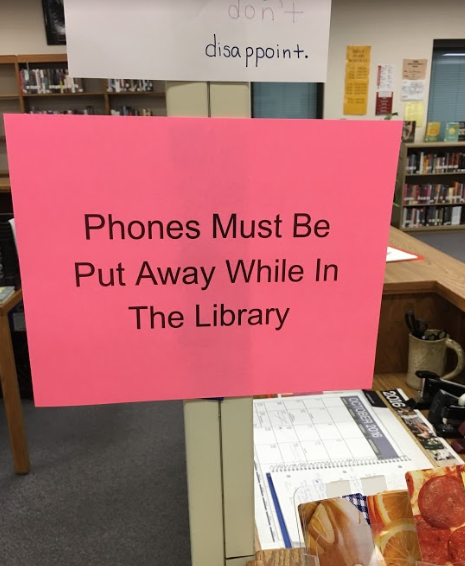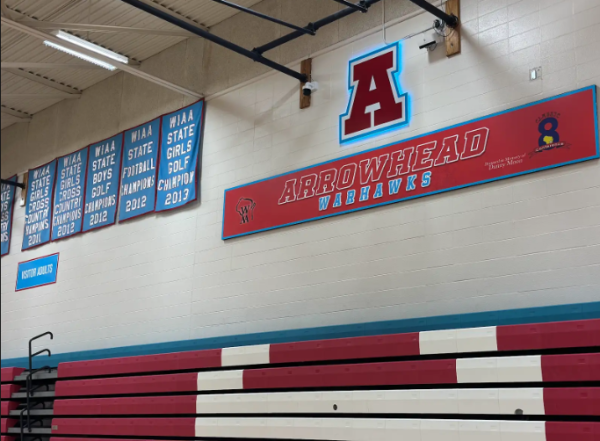Students Find Library’s No Phone Rule is No Fun

The no phones allowed sign hung in South Campuses library.
One of the rules enforced in the Arrowhead Union High School North and South library during study hall hours is no phones allowed. A student’s phone must be put in their backpack or locker. It can not be in a student’s pocket, lap, or out on the table. If a student is caught with their phone, the student is automatically sent back to the study hall room. But this rule is not embraced by the students at Arrowhead High School.
“I don’t think the no phone rule makes sense because many students use the library time to socialize and to contact parents if necessary. Students also use their phones to do homework and search things on the internet. It is completely unnecessary to take that away,” says sophomore, Savannah Knaak.
Many students are confused why the no phone rule is enforced because for most students, going in the library offers freedom.
Some classes require students to use their phone (especially if they are using a mobile app or email), but the librarians are firm when it comes to the no phone rule. Students receive only one or sometimes no warnings before being sent back to study hall, which angers some students.
“Getting sent back to study hall is not a fair punishment because the student will just go back into the study hall room and use their phone anyways,” says junior Mimi Bradley.
According to librarian aid Laurie Macey, the reasoning behind the no phone rule is simple: phones are perceived as distracting students from doing their school work. But this rule does not make sense in situations that require students to use it for school work or if they have already finished their work.
Other library rules that students don’t agree with are the no talking rule and no games rule. For students such as sophomore Jack Siepmann, going into the library is a time to sit with and converse with friends. Being told to whisper baffles students who use the library as a place to socialize.
“The no phone rule is not logical because they can be used for education and the reason people go into the library is to talk, not whisper. It doesn’t make sense that we can’t have our phones or talk when we don’t have anything to do,” says Siepmann.
According to Macey, the no phone rule was introduced at orientation for the 2016-2017 school year. Librarians and teachers were told to enforce the rule in the beginning of the year.
Macey says that the library is supposed to be used for educational purposes like homework or projects, not games and texting.
“The library is an opportunity to sit in groups of three and work with other students, not an opportunity to text and play computer games. The no phone rule is a way of keeping kids on task,” says Macey.
Although the rule may seem logical from the naked eye, many students including Knaak, Siepmann, and Bradley, agree that the no phone rule in the library and the consequences it associates with is not reasonable.
“I go to the library to reward myself for having my homework done. I always seem to end up disappointed because it is awful and feels more like a punishment. I get so angry when they yell at us for talking because I might as well not have come in the library if I’m not allowed to work with my peers. It is not fair and if they are going to be that strict they might as well cancel the library as a whole,” says Knaak.









